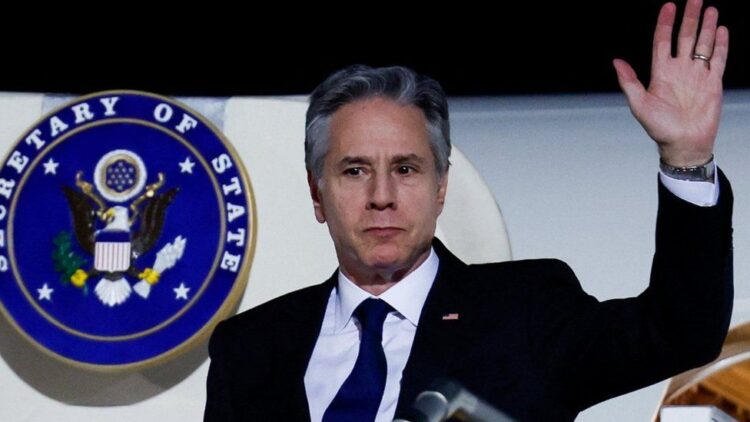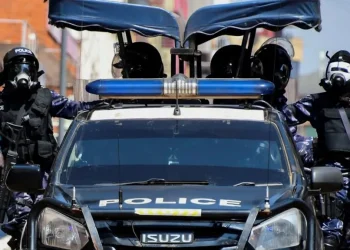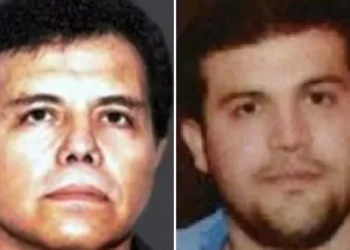US Secretary of State Antony Blinken says Palestinians must not be pressured into leave Gaza, and must be allowed to return to their homes once conditions allow. Mr. Blinken condemned statements by some Israeli ministers, who called for the resettlement of Palestinians elsewhere. The US official was in Qatar on his latest Middle East tour.
His comments come following reports that dozens of people were killed at a refugee camp in northern Gaza. Footage from Jabalia shows bodies lying in the rubble of a destroyed building – many of them women and children. The Israeli military has not yet responded to the reports.
More than 60 Palestinians have reportedly also been killed in the past day in the southern city of Khan Younis. The Jabalia camp has been hit several times since Israel began its war against Hamas following the unprecedented attack by Hamas gunmen on southern Israel on 7 October.
Some 1,200 people were killed – most of them civilians – and about 240 others taken hostage in the Hamas raids. More than 22,000 people – mostly women and children – have been killed in Gaza, according to the Hamas-run health ministry. It has reported at least 113 deaths over 24 hours of Israeli bombardment.
“Palestinian civilians must be able to return home as soon as conditions allow,” Mr. Blinken said on Sunday. “They cannot, they must not be pressed to leave Gaza.”
Israel’s far-right Finance Minister Bezalel Smotrich has called for Palestinians to leave Gaza and make way for Israelis who could “make the desert bloom”.
The official line from the Israeli government is that Gazans will eventually be able to return to their homes, though it has yet to outline how or when this will be possible.
Meanwhile, the situation in Gaza continues to deteriorate. Health officials said even medical facilities including hospitals are now unsafe. Three international medical aid groups announced they were pulling out of the Al-Aqsa Hospital in central Gaza after Israel issued evacuation orders.
A representative of the United Nation’s Office for the Coordination of Humanitarian Affairs (OCHA), told the BBC World Service’s Newshour programme that they were “hugely concerned by this development”.
“What it means is that a hospital that was already over-crowded and overloaded and well beyond its capacity is now without absolutely critical reinforcement to support it as it deals with an ever-increasing number of casualties,” said Gemma Connell.
The head of the World Health Organization, Tedros Adhanom Ghebreyesus, said that more than 600 patients and health workers were forced to leave the hospital, according to its director.
“Their locations are not currently known,” said Mr. Tedros in a post on X, formerly known as Twitter.
Mr. Blinken’s latest trip to the Middle East comes amid rising tensions in the region, with concerns that the war in Gaza could spread.
Saleh al-Arouri, a top Hamas official, was assassinated in a suspected Israeli attack in southern Beirut on Tuesday along with six others – two Hamas military commanders and four other members.
Hassan Nasrallah, the leader of Hezbollah, the powerful Iranian-backed movement in Lebanon, described Arouri’s assassination as a “flagrant Israeli aggression” that would not go unpunished. Hezbollah then fired rockets into Israel on Saturday as a “preliminary response” to the killing of Arouri.
“This is a moment of profound tension in the region. This is a conflict that could easily metastasize, causing even more insecurity and even more suffering,” Mr. Blinken said.
Qatar’s PM Sheikh Mohammed bin Abdulrahman al -Thani said that the killing of Arouri had affected “the complicated process”.
Mr. Blinken also said that the death of journalist Hamza al-Dahdouh, the eldest son of Al Jazeera’s Gaza bureau chief who was killed in an Israeli strike in southern Gaza., was “an unimaginable tragedy”. He added that “far too many innocent Palestinian men, women and children” have died in the war.
Mr. Blinken arrived in Qatar following stops in Jordan, Turkey and Greece. He went on to Abu Dhabi late Sunday, and on Monday is due to travel to Saudi Arabia.
Source: BBC News
















